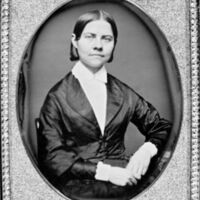Lucy Stone
Title
Lucy Stone
Description
In 1847, Lucy Stone graduated from Oberlin College, becoming the first women from Massachusetts to earn a bachelor's degree. Stone was a staunch advocate of both abolition and women's rights and she became one of the most important 19th century spokespeople for the women's rights movement. A principled advocate for equal justice, she blazed trails by refusing to pay taxes if she was denied the right to vote, insisting on equality in her marriage, and refusing to take her husband's name.
Birth Date
August 13, 1818
Birthplace
West Brookfield, Massachusetts
Death Date
October 18, 1893
Occupation
Abolitionist and Suffragist
Biographical Text
Lucy Stone was one of the most important proponents of women's suffrage in American history. She was born to a farming family in rural Massachusetts and after seeing relatives and other women she knew abandoned or abused by their husbands, decided that she would never allow herself to be dependent on a man.
She began her studies at Mount Holyoke Female Seminary in 1839, but soon left when she realized that the institution did not support either antislavery or women's rights. When she learned that the Oberlin Collegiate Institute had begun granting BAs to women, she studied for the entrance exams and enrolled in 1843 at the age of 25.
Even at Oberlin which admitted female students, her outspoken views on women's rights got her into trouble. In February 1845, she quit her student job after the Faculty Board refused her demand that she be paid as much as the male students who were doing the same work she was. Three months later, the faculty backed down and began giving women and men equal pay for the same work. When she discovered that the college did not consider it appropriate for women to debate men, she and her friend, Antoinette Brown, organized an off-campus women's debating club and then debated each other in front of Stone's rhetoric class. Stone was invited to write a graduation essay for her commencement, but refused to do so when she discovered that unlike the male students, she would not be allowed to read her own essay.
At Oberlin, Stone honed her skills at public speaking and soon after graduating, she became a lecturing agent for the Massachusetts Anti-Slavery Society. She also began giving lectures on women's rights and helped organize the first National Women's Rights Convention in 1850. Stone travelled throughout the US and to Canada to lecture on the importance of women's suffrage. She helped lead efforts to petition state legislatures to grant women the right to vote, and she worked with other leading women suffragists like Elizabeth Cady Stanton and Susan B. Anthony.
In 1869, Stone had a falling out with Stanton and Anthony when they refused to support the 15th Amendment (which gave Black men the right to vote) because it did not also include women. Stone supported the amendment despite its failure to include women and she and fellow suffragist Julia Ward Howe formed the American Women's Suffrage Association in 1869 to rival Stanton and Anthony's National Women's Suffrage Association. The AWSA worked to win support for women's suffrage at the state level. It also published the weekly, Woman's Journal, a newspaper started by Stone and her husband Blackwell, that Stone would edit for many decades.
Lucy Stone insisted on the principle of women's equality in her private, as well as her professional life. In 1859, her household goods were impounded and sold after she refused to pay taxes. Stone argued that taxing women who were denied the right to vote was a form of taxation without representation. When she married abolitionist Henry Blackwell in 1855, she removed any promise to obey from her wedding vows; Blackwell vowed at the ceremony that he would not avail himself of any laws that gave a man superiority over his wife. Stone refused to take Blackwell's name even when she was told that she could not register to vote in a local election in Massachusetts unless she used her husband's last name.
In her last public address in 1893 at the Chicago World's Exposition, Stone told her audience of the gratitude she felt "that the young women of today do not and can never now at what price their right to free speech and to speak at all in public has been earned." She died that same year. In 1986, the United States postal service honored her with a postal stamp.
She began her studies at Mount Holyoke Female Seminary in 1839, but soon left when she realized that the institution did not support either antislavery or women's rights. When she learned that the Oberlin Collegiate Institute had begun granting BAs to women, she studied for the entrance exams and enrolled in 1843 at the age of 25.
Even at Oberlin which admitted female students, her outspoken views on women's rights got her into trouble. In February 1845, she quit her student job after the Faculty Board refused her demand that she be paid as much as the male students who were doing the same work she was. Three months later, the faculty backed down and began giving women and men equal pay for the same work. When she discovered that the college did not consider it appropriate for women to debate men, she and her friend, Antoinette Brown, organized an off-campus women's debating club and then debated each other in front of Stone's rhetoric class. Stone was invited to write a graduation essay for her commencement, but refused to do so when she discovered that unlike the male students, she would not be allowed to read her own essay.
At Oberlin, Stone honed her skills at public speaking and soon after graduating, she became a lecturing agent for the Massachusetts Anti-Slavery Society. She also began giving lectures on women's rights and helped organize the first National Women's Rights Convention in 1850. Stone travelled throughout the US and to Canada to lecture on the importance of women's suffrage. She helped lead efforts to petition state legislatures to grant women the right to vote, and she worked with other leading women suffragists like Elizabeth Cady Stanton and Susan B. Anthony.
In 1869, Stone had a falling out with Stanton and Anthony when they refused to support the 15th Amendment (which gave Black men the right to vote) because it did not also include women. Stone supported the amendment despite its failure to include women and she and fellow suffragist Julia Ward Howe formed the American Women's Suffrage Association in 1869 to rival Stanton and Anthony's National Women's Suffrage Association. The AWSA worked to win support for women's suffrage at the state level. It also published the weekly, Woman's Journal, a newspaper started by Stone and her husband Blackwell, that Stone would edit for many decades.
Lucy Stone insisted on the principle of women's equality in her private, as well as her professional life. In 1859, her household goods were impounded and sold after she refused to pay taxes. Stone argued that taxing women who were denied the right to vote was a form of taxation without representation. When she married abolitionist Henry Blackwell in 1855, she removed any promise to obey from her wedding vows; Blackwell vowed at the ceremony that he would not avail himself of any laws that gave a man superiority over his wife. Stone refused to take Blackwell's name even when she was told that she could not register to vote in a local election in Massachusetts unless she used her husband's last name.
In her last public address in 1893 at the Chicago World's Exposition, Stone told her audience of the gratitude she felt "that the young women of today do not and can never now at what price their right to free speech and to speak at all in public has been earned." She died that same year. In 1986, the United States postal service honored her with a postal stamp.
Citation
“Lucy Stone,” Oberlin Community History Hub, accessed May 2, 2024, https://megansmitchell.org/DH694/items/show/230.

